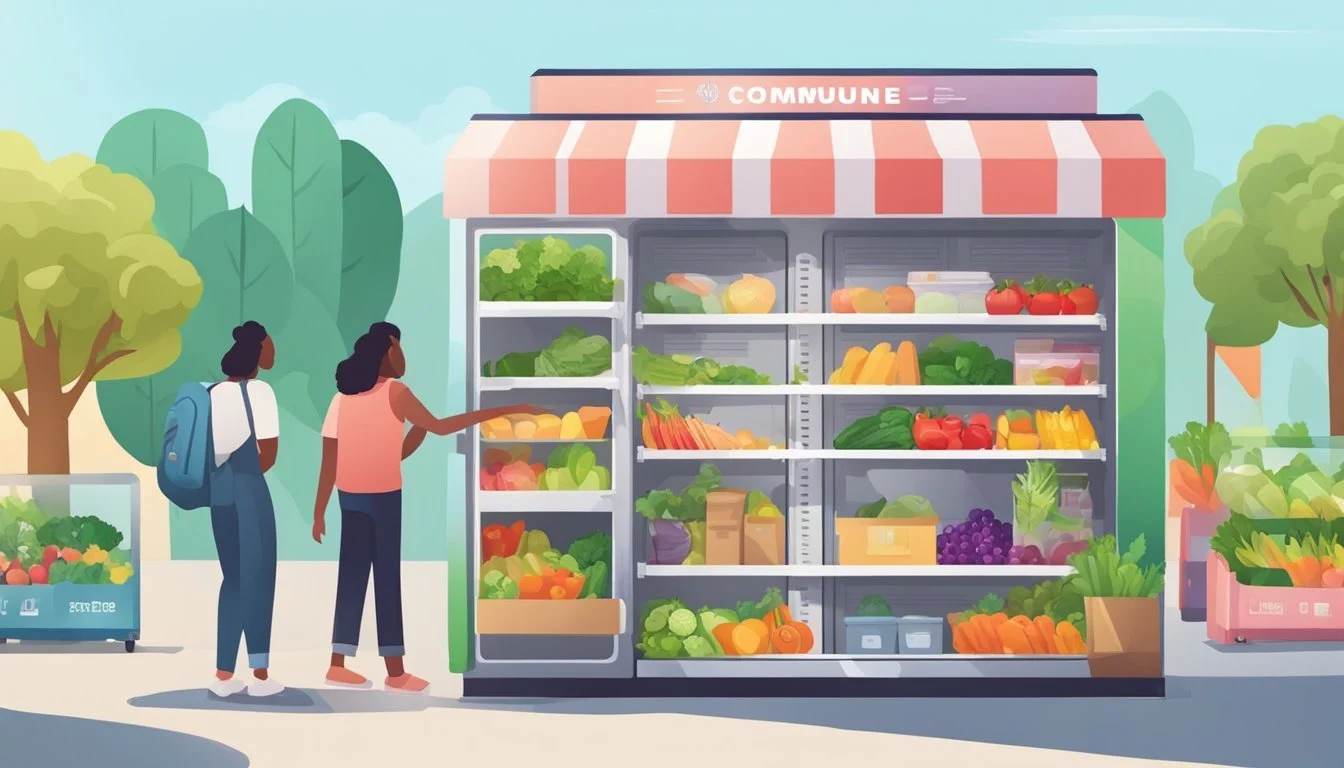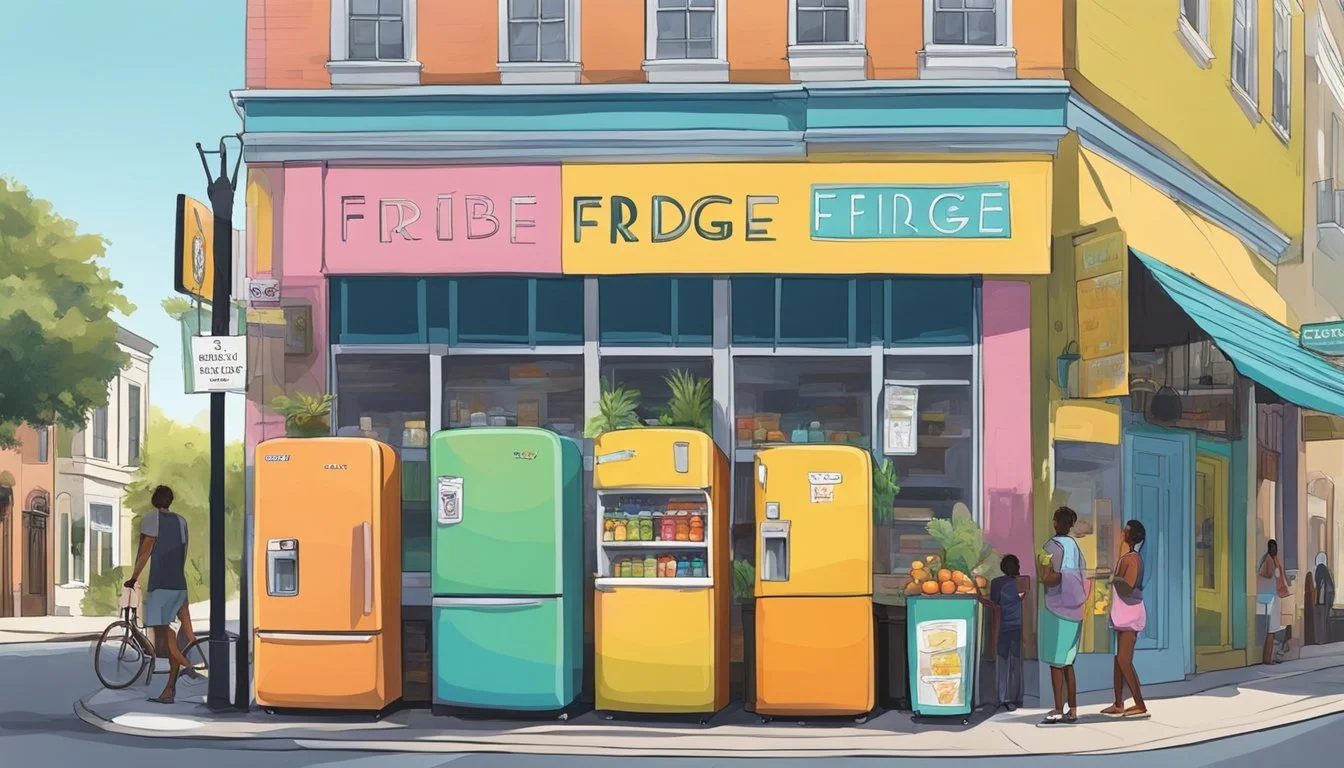Charleston, SC Community Fridge
Nourishing Neighborhoods with Shared Resources
In Charleston, South Carolina, an initiative known as the Free and Fresh Community Fridge Program is combating food insecurity by offering accessible nourishment to those in need. Established by the Charleston County Public Library, this program provides a unique twist on traditional food assistance services. By placing refrigerators stocked with free food items in public libraries, the program leverages existing community spaces to create points of support for residents.
The fridges, easily reached during library operating hours, are filled with a variety of food items, allowing anyone in the community to take what they need. With locations including St. Paul's Hollywood Library on Highway 165 and Otranto Road Library in North Charleston, the program stretches across the county, ensuring considerable outreach. By doing so, the Charleston Community Fridge initiative not only addresses immediate food shortages but also fosters a spirit of community and mutual aid.
In line with the program's expansion, additional funding has been secured to support and improve the initiative. This growth reflects the importance of such community-based solutions in local food systems and highlights the commitment to addressing food scarcity in urban areas. The strategic placement of these fridges within libraries—a central and familiar location for many—exemplifies an innovative approach to ensuring that fresh and nutritious food is more equitable and accessible to all community members.
Background and Overview
The Charleston County Public Library has taken a significant step to address food insecurity by establishing the Community Fridge Program. This initiative collaborates with the community to provide free and accessible food to residents, particularly in areas facing higher needs.
Origins of Community Fridges
Community fridges are a global phenomenon designed to mitigate food waste and address hunger by enabling people to share surplus food. In 2021, the Charleston County Public Library system identified the need for such a program and launched the first set of community fridges.
Food Insecurity in Charleston County
Charleston County faces challenges regarding food insecurity, which affects a sizable portion of the community. Despite the region's richness in food production, not all residents have consistent access to fresh and healthy food options, prompting the need for support systems like community fridges.
The Role of the Community Fridge Program
The Community Fridge Program in Charleston aims directly at combating food insecurity by offering fresh produce to the public without cost. It is hosted across libraries in strategic locations, ensuring a wide reach. The program not only provides food but also encourages community engagement and combats social stigma associated with needing food assistance.
By employing this strategy, the program aims to ensure that support is discreet, local, and readily available, fostering a sense of community solidarity in the fight against hunger. Each fridge is stocked with an array of food items meant to nourish those in immediate need.
Locations and Access
The Charleston, SC community benefits from easy access to free food through the Community Fridge program. This initiative spans across multiple locations including public libraries and recreational spots. Each location provides food at no cost to ensure everyone in the community has the means to nutritious offerings.
Library-Based Fridge Sites
The Charleston County Public Library (CCPL) has incorporated Free and Fresh Community Fridges at several of their branches, dedicated to providing free food items to the public. Specific library locations equipped with these fridges include:
St. Paul’s Hollywood Library
Address: 5130 HWY 165 Hollywood, SC
Contact: 843-889-3300
Operating hours: For the most current information, visit CCPL.org.
Otranto Road Library
Address: 2261 Otranto Road, North Charleston, SC
Contact: 843-572-4094
Operating hours: Available at CCPL.org.
John L. Dart Library
Address: 1067 King St., Charleston, SC
Contact: 843-722-7550
Operating hours: See the CCPL official website for hours.
These fridges are accessible during the respective library operating hours, making them a reliable source of food assistance.
Charleston Parks and Recreational Fridge Spots
While specific parks and recreational locations were not noted in the provided search results, typically such programs are available in some community centers and parks. For the most current locations and access details, individuals are encouraged to check with Charleston Parks and Recreation Department's resources or community bulletins in the region.
Other Participating Branches and Locations
Other branches and locations may participate in the Community Fridge program, extending the reach and effectiveness of this community service. As the program grows, additional fridge sites may become available. Interested individuals should stay informed by monitoring local community announcements and checking in with other community centers and faith-based organizations that may host a fridge.
Food Donation Guidelines
The Charleston Community Fridge initiative thrives on the generosity of individuals and businesses. Donors should focus on providing wholesome, nourishing food options while adhering to safety and health regulations.
Acceptable Donations
Fruits and Vegetables: They accept a variety of fresh produce items. Specify whole fruits and vegetables that have not been cut or processed to maintain freshness and comply with health standards.
Fresh Produce Examples Fruits Apples, bananas, oranges Vegetables Carrots, leafy greens, peppers
Packaged Meals: If sealed and labeled with ingredients and a use-by date, healthy prepared meals can be a valuable donation.
Other Perishables: Donations like loaves of bread or dairy must be unopened and within their use-by dates.
Prohibited Items
Raw Meat and Fish: Due to the potential health risks involved with storing and handling, these items are not accepted.
Alcohol: To maintain a family-friendly service, alcohol donations are strictly prohibited.
Expired or Partial Produce: Donors are urged not to include produce that is past its use-by date or partially consumed to ensure health safety.
Prohibited Reason for Prohibition Raw Meat/Fish Health risks associated with improper storage and contamination. Alcohol Maintaining a family-friendly environment. Expired Produce Health safety and quality concerns.
Community Impact
The Charleston Community Fridge initiative significantly influences local communities by improving access to healthy food, enhancing educational opportunities regarding nutrition, and connecting residents with local food sources.
Addressing Health Disparities
Health Disparities - The Free and Fresh Community Fridge Program tackles health disparities head-on by providing access to nutritious food items. This program is strategically placed in Charleston County Public Library branches within areas marked by higher food insecurity. Access to fresh fruits and vegetables is crucial in these communities, where residents may otherwise face limited options that contribute to poor health outcomes.
Supporting Food Literacy and Education
Food Literacy and Education - Beyond the distribution of food, the program includes food literacy programming and culinary and health education. Patrons learn about ingredients through nutrition information provided with the food. This empowers them to make informed decisions that benefit their health. The inclusion of simple recipes ensures that individuals not only have the necessary ingredients but also the knowledge to prepare healthy meals at home.
Strengthening Local Food Systems
Local Food Systems - The initiative plays a vital role in strengthening local food systems by connecting community members directly with local produce. This not only supports area farmers but also encourages a sustainable food model within the community. The emphasis on local ingredients helps foster a culture of supporting neighborhood economies and reinforces the importance of fresh, regionally-sourced food.
Programs and Partnerships
The Free and Fresh Community Fridge program in Charleston, SC, has established a robust network of partnerships and educational initiatives to provide healthy food and knowledge to the community.
Partnerships with Local Libraries and Organizations
The partnership between the Charleston County Public Library (CCPL) and local organizations is the cornerstone of the Free and Fresh Community Fridge initiative. Specifically, libraries such as St. Paul’s/Hollywood Library have become access points for community fridges. In collaboration with CCPL, The Joanna Foundation and the SC Department of Health and Environmental Control have supported these efforts by providing grants, including a library and health community health engagement mini-grant. Other partnerships include Fields to Families, Lowcountry Food Bank, and initiatives like the Kids Café program and Charlie Cart cooking programs coordinated by the Charleston County School District.
St. Paul’s/Hollywood Library: Acts as a flagship location for Community Fridges.
Lowcountry Food Bank and Vertical Roots: Supply locally grown produce.
Partnerships and Funding: Supported by The Joanna Foundation, library and health community health engagement mini-grants, and more.
Educational Programs and Initiatives
Educational components are integrated into the Free and Fresh program. Kathleen Montgomery, known for her work at CCPL, along with other coordinators, have implemented educational strategies to enhance the impact of the program. Projects such as the Summer Feeding initiative, Healthy Tri-County, and programs designed by Food Rescue US deliver education on nutrition and food sustainability, alongside the provision of fresh food.
Charlie Cart Cooking Programs: Promote cooking education.
Healthy Tri-County and Food Rescue US: Develop community-driven health engagement strategies.
Community Garden and Local Farm Contributions
Community involvement extends to local agriculture, with entities such as Katie’s Krops and The Stone Soup Collective working with community gardens to contribute to the fridges. Roper St. Francis and the Center for Primary Healthcare have contributed to the integration of health-focused programs. Local farms provide fresh, locally grown produce, emphasizing the importance of sustainable food systems.
Local Farms and Gardens: Donate fresh produce to Community Fridges.
Health Care Integration: Contributions from Roper St. Francis and Center for Primary Healthcare bolster the program's health aspect.
How to Get Involved
Charleston community members can engage with the local Community Fridge initiative by contributing donations or by dedicating their time and effort as volunteers. Both avenues play a crucial role in addressing the community’s hunger and health challenges.
Donating to the Community Fridges
Donations: Monetary contributions can be made to support the fridges' operation. Interested donors can use PayPal to send funds directly to organizations like Katie's Krops or The Stone Soup Collective, which are deeply involved with the community fridge programs.
Food donations: Individuals looking to donate food can drop off their contributions at any participating community fridge locations. It's encouraged to donate fresh produce and healthy after school snacks for community use.
Volunteering and Becoming an Advocate
Volunteer Registration: Those who wish to volunteer can register through the affiliated organization's website. The Stone Soup Collective and organizations like Katie's Krops regularly seek volunteers to manage the fridge sites—including stocking and cleaning—to ensure the fridges are well-maintained for community use.
Advocacy: As a volunteer, there is also the opportunity to become an advocate for the program, raising awareness about food insecurity and promoting the benefits of the community fridge to increase its impact within Charleston. Volunteers may also educate others on how to contribute effectively to the program.
Events and Fundraising
Charleston's Community Fridge initiative actively engages in various events and fundraising efforts to support food accessibility. The community comes together through organized events and campaigns to ensure the fridges remain stocked with fresh food items.
Community Events and Pop-Up Drives
Charleston, SC, regularly hosts community events and pop-up drive-thru events to gather meals and snacks for the Community Fridge program. Partnerships with local organizations, such as the S.C. Stingrays and the City of Charleston Farmer’s Markets, enhance these efforts. The farmer's markets serve as key collection points where donors can drop off fresh produce directly into fridges.
A recent example includes a pop-up event at:
Location: West Ashley
Date: April 20, 2024
Items Collected: Fresh fruits, vegetable snacks, and prepared meals
Fundraising Campaigns and Donor Recognition
To support the initiative financially, the Community Fridge program regularly coordinates fundraising campaigns. Monetary contributions are essential for maintaining and expanding fridge locations. Donors are recognized through various channels, including Facebook, Twitter, and Instagram, providing public acknowledgments to foster a culture of community support.
For example, a recent campaign included:
Goal: Acquiring an additional fridge unit
Raised: $5,000 over 2 weeks
Recognition: Donors highlighted on social media and at fridge sites
Social Media Channels:
Facebook: Charleston Community Fridge
Twitter: @ChsFridge
Instagram: @chs_communityfridge
Additional Resources and Information
The Free and Fresh Community Fridge initiative in Charleston, SC extends its reach beyond physical locations through various online platforms and by offering educational materials. These resources aid in promoting the program, enhancing community engagement, and providing valuable information on nutrition and food preparation.
Online Platforms and Social Media
Facebook and Instagram serve as the primary social media channels for the Free and Fresh Community Fridge program. Through these platforms, they can quickly disseminate program updates, share news on additional fridge locations, and engage with the community. Followers can expect regular posts that include:
New fridge installment announcements
Updates on available produce
Notification of events and initiatives related to food security
Platform Content Focus Facebook Program news, community stories, and engagement with residents Instagram Visual content featuring fridge locations and available produce
Educational Materials and Recipe Sharing
The program emphasizes the importance of nutrition information and offers simple recipes that utilize ingredients from the community fridges. These resources help individuals make the most out of the available food items, and they're accessible to all, fostering a better understanding of healthy eating habits. Educational materials may cover topics such as:
Nutritional value of different fruits and vegetables
Tips for food storage and preservation
Creative and easy-to-follow recipes for meal preparation
Recipes and nutrition tips are shared through leaflets available at the fridge locations and online platforms. Additionally, links to these resources are regularly posted on social media to encourage the community to try new dishes and learn more about the foods they consume.
Future Prospects
The Charleston, SC Community Fridge initiative is poised for significant scaling and lasting impact on local food security. This expansion is twofold, involving both the physical reach of the program and its deeper integration into community health strategies.
Goals for Expansion
The Free and Fresh Community Fridge Program envisions adding more locations across Charleston County. Registration for access is designed to be straightforward, ensuring that everyone in the community can partake in the nutritional benefits offered by the fridges. Expansion goals include:
Increasing the number of Free and Fresh Community Fridges to cover more neighborhoods, especially those identified as food deserts.
Partnering with local farms and businesses to diversify available ingredients and promote fresh, local produce.
Long-Term Community Benefits
Long-term benefits of the program extend beyond addressing immediate food insecurity. They encompass a holistic approach to community wellness through:
Implementing community-driven health engagement strategies to educate on nutrition and healthy eating habits.
Tracking health outcomes to assess and improve the program's impact, reinforcing the notion that community fridges are more than a temporary fix—they're part of a sustainable health infrastructure.









